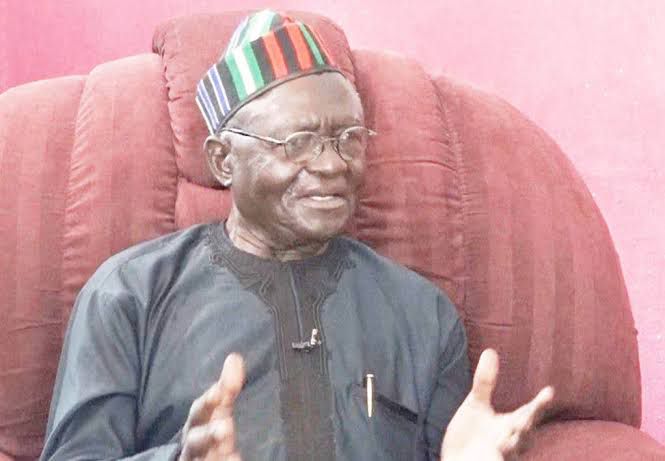Is Zamani Lekwot an Elder Statesman?, by Nura Bako Zango
In a country still grappling with the wounds of ethno-religious conflicts and insecurity, the use of titles carries weight especially when used by those in power.
A recent statement by the serving governor of Kaduna State, His Excellency, Senator Uba Sani, referring to retired Major General Zamani Lekwot as an “elder statesman” during a condolence visit has raised eyebrows and rekindled bitter memories among many Nigerians who view him through a very different lens. As they say “History does not forgive.” It’s what one did that would be said about/against him.
For decades, the name Zamani Lekwot has not evoked the image of an elderly voice of peace and wisdom but rather conjured painful recollections of conflict, death, genocide and division especially in the hearts of the Muslims who suffered during the infamous Zangon Kataf crisis of 1992, which he orchestrated and masterminded and his tribesmen executed.
Who is an Elder Statesman?
Traditionally, an elder statesman is a retired leader—often political or military who has risen above partisan politics to become a unifying figure, a voice of moral authority, and a symbol of peace, reconciliation, and wisdom. Elder statesmen are those whose lives and records reflect integrity, patriotism, and an unwavering commitment to the common good of their country and its citizens.
Applying this label to someone with a record of divisiveness, incitement, terrorism, genocide and unresolved allegations of mass violence stretches the term to a dangerous breaking point.
READ ALSO: You’ve made Kaduna safer, Army Chief tells Uba Sani
Zamani Lekwot’s military career, though commendable in discipline and rank, became tainted by his role in the Zangon Kataf ethno-religious violence that saw hundreds of innocent Muslims lives lost.
He was arrested, tried, and convicted by tribunals for his alleged role in the Zangon Kataf massacre, though later granted state pardon.
While many, especially the victims of his terrorism, continue to debate the fairness of the trial, the undeniable fact remains: under his influence and command, blood was shed, communities were torn apart, and distrust was sown.
Those who lived through the crisis and lost loved ones see Lekwot not as a statesman, but as a symbol of a dark past that has never truly healed.
To put the title into further perspective, let’s compare Lekwot’s legacy with globally known figures associated with terror and conflict:
READ ALSO: 20 Years of Neglect: Uba Sani blames El-Rufai for unrenovated Kaduna hospitals
Joseph Kony, the Ugandan warlord behind the Lord’s Resistance Army (LRA), was responsible for atrocities across central Africa. Though originally a self-proclaimed prophet and rebel leader, no one would dare call him a statesman.
Radovan Karadžić, the Bosnian Serb leader during the Yugoslav Wars, was tried for genocide and war crimes. Despite his former political office, international law treated him as a war criminal—not a respected elder.
If Zamani Lekwot is an elder statesman to the incumbent governor of Kaduna State, then figures like Abubakar Shekau of Boko Haram, Gana of Benue State notoriety or Bello Turji, should be respectfully applauded and be given the same title of “elder statesmen”, because both of them are birds of a feather.
Shekau for example should have been decorated by the Borno state government as an elder statesman and co-chair of Borno state Elders forum just to score cheap political points. To be honest, terrorists should be treated as terrorists except if they repent and seek forgiveness from God and the families of their victims they have terrorised. Then, why is Kaduna State different? Is our government celebrating terrorists and decorating them with venerable titles for political gain?
Why then should Zamani Lekwot, whose name is tied to mass bloodshed and deep ethnic strife, be an exception?
READ ALSO: Tinubu confers national honour on ex-Kaduna military governor
When state leaders decorate controversial figures with honorable titles, it sends a dangerous signal: that the state forgets, or worse, forgives atrocities without justice or reconciliation. It dishonors the memory of the victims and erodes public trust in leadership.
Calling Zamani Lekwot an elder statesman may be politically expedient for some, but it is morally insensitive, socially divisive, and historically dishonest.
Nigeria’s fragile unity and ongoing struggle with insecurity demand leaders who are sincere about peace and justice—not those who glorify controversial legacies for convenience.
Zamani Lekwot may have worn a uniform, commanded troops, and aged into his later years but that does not automatically confer upon him the revered status of an elder statesman especially to the victims of Zangon Kataf that he had murdered in cold blood.
If we must move forward as a nation, we must be careful with the honours we bestow and the legacies we choose to sanitize. Let history be fair—but let it also be honest.
Follow the Neptune Prime channel on WhatsApp:
Do you have breaking news, interview request, opinion, suggestion, or want your event covered? Email us at neptuneprime2233@gmail.com





